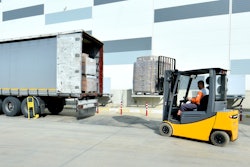Trucking news and briefs for Friday, Aug. 27, 2021:
Shipper conditions remain tough
FTR’s Shippers Conditions Index (SCI) for June, as reported in the August Shippers Update, fell back to a reading of -12.0 reflecting a continuing tough environment for shippers. Shipper market conditions remain highly negative.
Freight rates improved slightly during June, but it was not enough to offset tighter capacity utilization and little change in other components – volume and fuel costs – to hold off the drop in the SCI for the month. FTR’s latest freight volume outlook is slightly weaker at 6.3% growth year-over-year in 2021 down from the previous +6.9% projection.
“The capacity situation is expected to remain tight into 2022 and while rate increases are expected to moderate their rates of growth through the next several months, they will for the most part remain in positive territory meaning shippers’ rate relief might feel good, but it is a matter of degrees as rates will still be going up year over year," said Todd Tranausky, vice president of rail and intermodal at FTR.
FMCSA looks to quantify number of trucks using COVID-related HOS waiver
The Federal Motor Carrier Safety Administration is requesting emergency approval from the White House Office of Management and Budget to collect information from motor carriers using the COVID-19 hours of service waiver.
The waiver has been in place in some form since mid-March 2020, allowing carriers and truck drivers providing direct relief to the ongoing emergency to operate outside of normal hours of service regulations. The emergency declaration has been extended several times over the last year-and-a-half and is currently set to expire Aug. 31. It’s unclear whether the agency will extend the waiver again.
FMCSA said that neither the emergency declaration nor the regulations covering emergency declarations require that motor carriers and drivers operating under the declaration report their operation to FMCSA.
“As a result, FMCSA does not know how many motor carriers or drivers are relying on the Emergency Declaration,” the agency said in its request to OMB.
FMCSA added that with the “unprecedented period” that the waiver has been in effect, the agency feels it is necessary to seek information “on the number of motor carriers and drivers relying” on the waiver “to evaluate the need for future extensions or modifications.”
The agency requested that OMB approve the information collection request within seven days.
Locomation, ZF announce partnership
Locomation, a provider of autonomous truck technology solutions, Thursday signed a collaboration agreement with ZF, one of the largest automotive and commercial vehicle suppliers in the world, for joint development of steering units to enhance autonomous truck safety.
Under the terms of the agreement, ZF and Locomation will co-develop and test ZF's Level 4 capable ReAX steering systems in real-world conditions. Level 4 ReAX offers full redundancy to achieve rigorous safety standards, which ensure that a system functions correctly and demonstrates the ability to maintain safe operations at all times by detecting and managing faults.
Julien Plenchette, ZF Group vice president, Americas, Commercial Vehicle Division, said Locomation's approach to autonomy "offers an opportunity to get to market earlier, which provides ZF with real-world data in order to enhance our technology.”
Locomation is aiming to deploy its first product line, Autonomous Relay Convoy, in late 2022, starting with Wilson Logistics (CCJ Top 250, No. 98) and following with PGT Trucking (No. 103) to fulfill the contracts for a total of 2120 trucks between the two customers.











